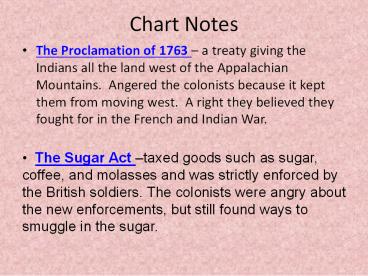Chart Notes - PowerPoint PPT Presentation
Title:
Chart Notes
Description:
Chart Notes The Proclamation of 1763 a treaty giving the Indians all the land west of the Appalachian Mountains. Angered the colonists because it kept them from ... – PowerPoint PPT presentation
Number of Views:35
Avg rating:3.0/5.0
Title: Chart Notes
1
Chart Notes
- The Proclamation of 1763 a treaty giving the
Indians all the land west of the Appalachian
Mountains. Angered the colonists because it kept
them from moving west. A right they believed
they fought for in the French and Indian War.
- The Sugar Act taxed goods such as sugar,
coffee, and molasses and was strictly enforced by
the British soldiers. The colonists were angry
about the new enforcements, but still found ways
to smuggle in the sugar.
2
- The Stamp Act the Stamp Act put a tax on ALL
printed goods including books, papers,
newspapers, official forms, dice, cards, etc.
The colonies were so angry that they created the
Stamp Act Congress with representatives from most
of the colonies. The congress decided to
boycott, refuse to buy, all printed goods. It
worked! England repealed, discontinued, the
Stamp Act. Also at this time, Samuel Adams
created the Sons of Liberty, a group of colonists
who began pushing for independence.
3
- The Townshend Acts a law putting tax on several
different things like lead, glass, tea, etc.
The colonists fought against these items with
further boycotts of British goods. In fact,
colonists were encouraged not to buy any British
Goods.
The Daughters of Liberty organized themselves to
teach each other how to make their own cloth and
do other things to keep from buying British
goods.
4
- The Boston Massacre started as a snowball fight
and escalated into an angry mob. Five colonists
were killed, including Crispus Attucks a free man
and the first African American killed for the
cause.
The Committee of Correspondence was created, to
communicate any further British conflicts to all
the colonies. Colonists used the Boston Massacre
as propaganda, information designed to influence
opinion, against the British.
5
- The Tea Act of 1773 Most of the Townshend Acts
were repealed, but the British knew the colonists
would have trouble giving up their Tea so the Tea
Act reinforced the tax made in the Townshend
Acts. Several of the Sons of Liberty dressed
like Indians and boarded several ships in the
harbor and dumped their tea overboard. This
became known as the Boston Tea Party.
6
- The Intolerable Acts (or the Coercive Acts) -King
George was furious about the Boston Tea Party.
He insisted the colonists must be punished. The
punishments included Boston Harbor was closed
no goods in or out of Boston - No more town meetings assemblies were sent home
- More soldiers were sent to enforce these new laws
- Bostonians were forced to allow soldiers to stay
in their homes without paying
The colonists believed this act took away many of
their rights as British citizens. The
Continental Congress with representatives from
each of the colonies met together to decide what
to do.
7
Steps to the Revolution
Each step moved us closer to war
British Actions
The Intolerable Acts
The Tea Act
The Boston Massacre
The Townshend Acts
The Stamp Act
The Proclamation of 1763
The Sugar Act
WAR
1763 1764 1765 1767
1770 1773 1774
Colonial Responses
Continental Congress
The Boston Tea Party
The Committee of Correspondence
The Stamp Act Congress Sons of Liberty
More boycotts Daughters of Liberty
Colonists were angry
Smuggling
8
Key Vocabulary
- Boycott
- Loyalists
- Patriots
- Mercantilism
9
Boycott
- A boycott is an act of voluntarily abstaining
from using, buying, or dealing with a person,
organization, or country as an expression of
protest, usually for social or political reasons. - Ex. I will boycott any Apple products until they
bring down their prices for Iphones!
10
Loyalists
- American colonists who remained loyal to the
British Empire and the British monarchy during
the American Revolutionary War.
11
Patriots
- a person who vigorously supports their country
and is prepared to defend it against enemies or
detractors
12
Mercantilism
- also called the mercantile system, was based on
the benefits of profitable trading. Countries
adopted trade policies that favored the flow of
wealth from the colonies to the mother country - Mercantilism is based on the concept of
increasing profits by controlling trade































